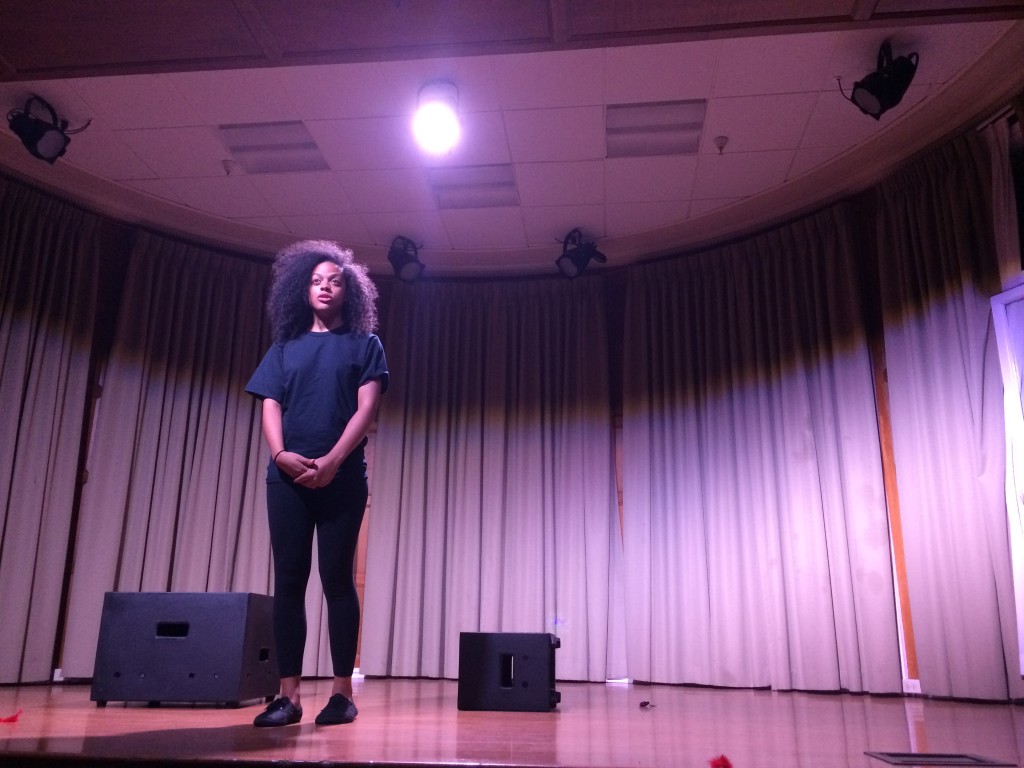
Cunt. Flower. Coochi Snorcher. Pussy. Twat. Vagina.
These are all words that describe and empower the “female” body in Eve Ensler’s The Vagina Monologues, which was shown in Roble Theater this past weekend. Since its inception in 1996, the show has made it all over the world, and been performed hundreds of times a year. HBO produced a special documentary of Ensler performing it to a small audience. The powerful language has inspired women all over the world to love their bodies and face their sexual trauma.
There is controversy surrounding the show, however: the erasure of indigenous women’s activism by One Billion Rising and V Day, and Ensler’s colonialist portrayals of non-Western women. Another of Ensler’s projects is the City of Joy, a home for survivors of sexual violence in the Democratic Republic of the Congo. This “leadership community” was built in with the best intentions, but reeks with the suspicious of the White Savior Complex. When I went to this year’s production, there were two issues at the forefront of my mind:
- A short open letter to Eve Ensler: Dear Eve, as a sex educator, I cringed at your lack of anatomical distinction. THE VULVA AND THE VAGINA ARE DIFFERENT, EVE. HAIR DOES NOT GROW IN THE VAGINA. Your nether region is not an amorphous blob, so don’t lump the labia and the clitoral hood and all the other bits together into one term.
- The Vagina Monologues lauds the power of women, but not all women or female-identifying people have vaginas. This narrow-minded view excludes transgender women. Mount Holyoke canceled their production this year because “it is not inclusive enough”. Director Rachel Zilburg wrote in her director’s note, “we have decided to produce the play while fostering a conversation about gender identity, transmisogyny, fetishisation of trans bodies, and institutionalised violence.” This year, ticket sales went to Lyon-Martin Clinic, a center in San Francisco that provides health services to local low-income LGBT populations—the center is particularly significant in the area for providing hormone therapy for trans people regardless of their ability to pay. This is all very well and good, but should the production still have been pursued? Debatable. I think that the show can be powerful and an incredible experience for some women, but at what cost for others?
Despite these issues, The Vagina Monologues has a special place in my heart (and in my vagina). As an acne-speckled and early-developing teenager in a conservative hometown, I was desperate to understand my body. When I got my first period, I started writing my will because I thought I was dying. Thank Goddess I stumbled across the script in my local library. In an afternoon, I learned about douches, Female Genital Mutilation, sexual assault and rape, cunnilingus, tampons (“a fucking wad of dry cotton, what the hell is that?”), intimacy, penises, masturbation, the clitoris, lesbians, Queers, pubic hair (and lack thereof), birth, speculums and pap smears, violence against transgender women, cumming, kink, virginity, and wet dreams about Burt Reynolds.
When I turned 15 and I suddenly had my own trauma associated with my vagina, I turned back to the Monologues to try to understand it. A quote that has stuck with me in times of vaginal dissociation is: “The heart is capable of sacrifice. So is the vagina. The heart is able to forgive and repair. It can change its shape to let us in. It can expand to let us out. So can the vagina. It can ache for us and stretch for us, die for us and bleed and bleed us into this difficult, wondrous world.” These words nestled into me comfortingly, and have stayed there ever since.
The Monologues are also humorous in places. Perhaps my favorite moment of the whole show is the introduction to the piece Because He Liked to Look At It, which is the simple one-liner “This monologue… is about a women who had a good experience with a man”, pointing out the rarity of a genuinely pleasant and reciprocal heterosexual encounter. The actors in this year’s show were not shy in their approach to the text—not all pieces from the original production were performed, but the included ones were intentionally curated. Avanti Shrikumar’s charismatic interpretation of My Angry Vagina had everyone laughing. Mia Ritter-Whittle writhed on the floor in pretend-ecstasy in The Woman Who Loved To Make Vaginas Happy, completely and without abandon. My Vagina Was My Village, a piece based on the experiences of Bosnian women refugees who had survived rape camps in former Yugoslavia, was performed with a disturbing quiet and strength. The most deliberate piece was They Beat The Girl Out Of My Boy… Or So They Tried, obviously chosen by Zilberg for its transgender narrative.
The intimacy of Roble Theater lent itself well to the show—however, the transitions between monologues were choppy. The set was minimalist, and the costumes straight from the actors’ wardrobes. Some words were stumbled over, and some were spoken too hastily. But as I was walking out the door, I overheard one freshman say to another “I don’t think I’ve ever thought about my body like this before, and it feels strangely magical.” And that, to me, is success.
If you feel your narrative is absent in The Vagina Monologues, attend the open mic event, “Outside The Script”, at 7 PM on May 1st at the LGBT CRC to write and perform your own monologue.
